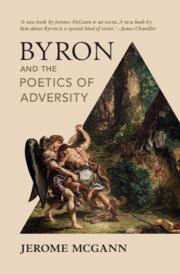Book contents
- Reviews
- Byron and the Poetics of Adversity
- Byron and the Poetics of Adversity
- Copyright page
- Dedication
- Epigraph
- Contents
- Acknowledgments
- Introduction
- 1 Don Juan and the English Language
- 2 Byron Agonistes, 1809–1816
- 3 Manfred
- 4 Byron and the “Wrong Revolutionary Poetical System”
- 5 Byron, Blake, and the Adversity of Poetics
- 6 The Stubborn Foe
- Notes
- Index
6 - The Stubborn Foe
Bad Verse and the Poetry of Action
Published online by Cambridge University Press: 27 November 2022
- Reviews
- Byron and the Poetics of Adversity
- Byron and the Poetics of Adversity
- Copyright page
- Dedication
- Epigraph
- Contents
- Acknowledgments
- Introduction
- 1 Don Juan and the English Language
- 2 Byron Agonistes, 1809–1816
- 3 Manfred
- 4 Byron and the “Wrong Revolutionary Poetical System”
- 5 Byron, Blake, and the Adversity of Poetics
- 6 The Stubborn Foe
- Notes
- Index
Summary
A conspectus of contemporary negative judgments of Byron’s morals and poetry throws into relief the character of what Wilson Knight long ago called Byron’s poetry of action. Political and social issues are repeatedly drawn up as a struggle over language and the proper function of poetry in society. The first two cantos of Childe Harold’s Pilgrimage stage a drama of Byron’s search for a poetic address to break the spells of linguistic decorum. Two events were pivotal: the experience of hearing wild Suliote ballads, and the example of Burns’s “unpublishable” and imperishable erotic verse. The book’s account of these matters closes with a reflection on the Hebrew Melodies, where “stubborn Israel’s” histories of alienation and betrayal point to the poète maudit – and Byron – as the age’s exemplary cultural hero.
Keywords
- Type
- Chapter
- Information
- Byron and the Poetics of Adversity , pp. 154 - 182Publisher: Cambridge University PressPrint publication year: 2022

